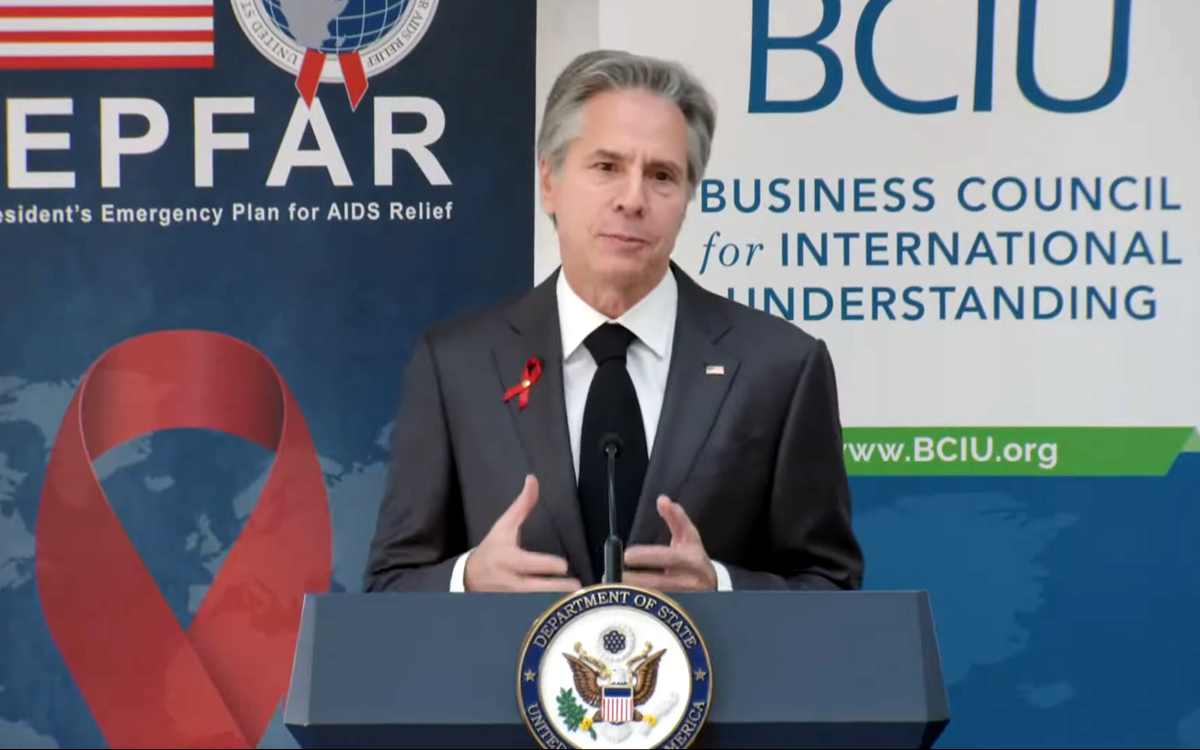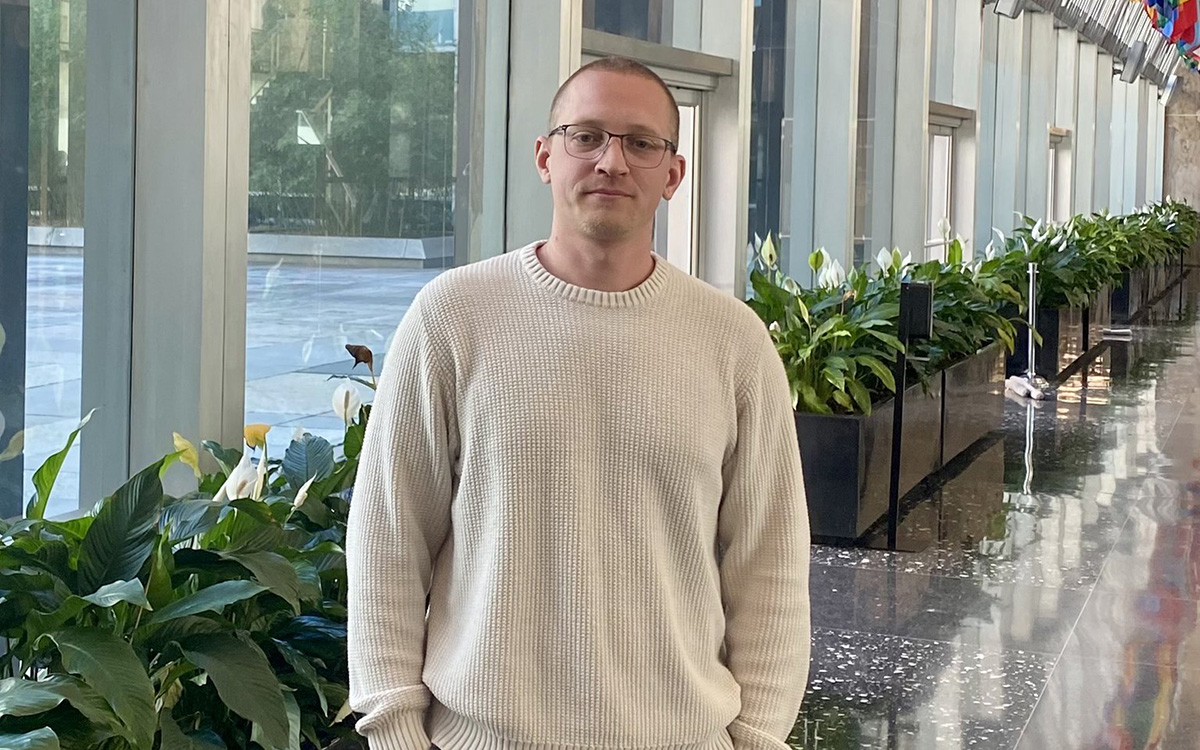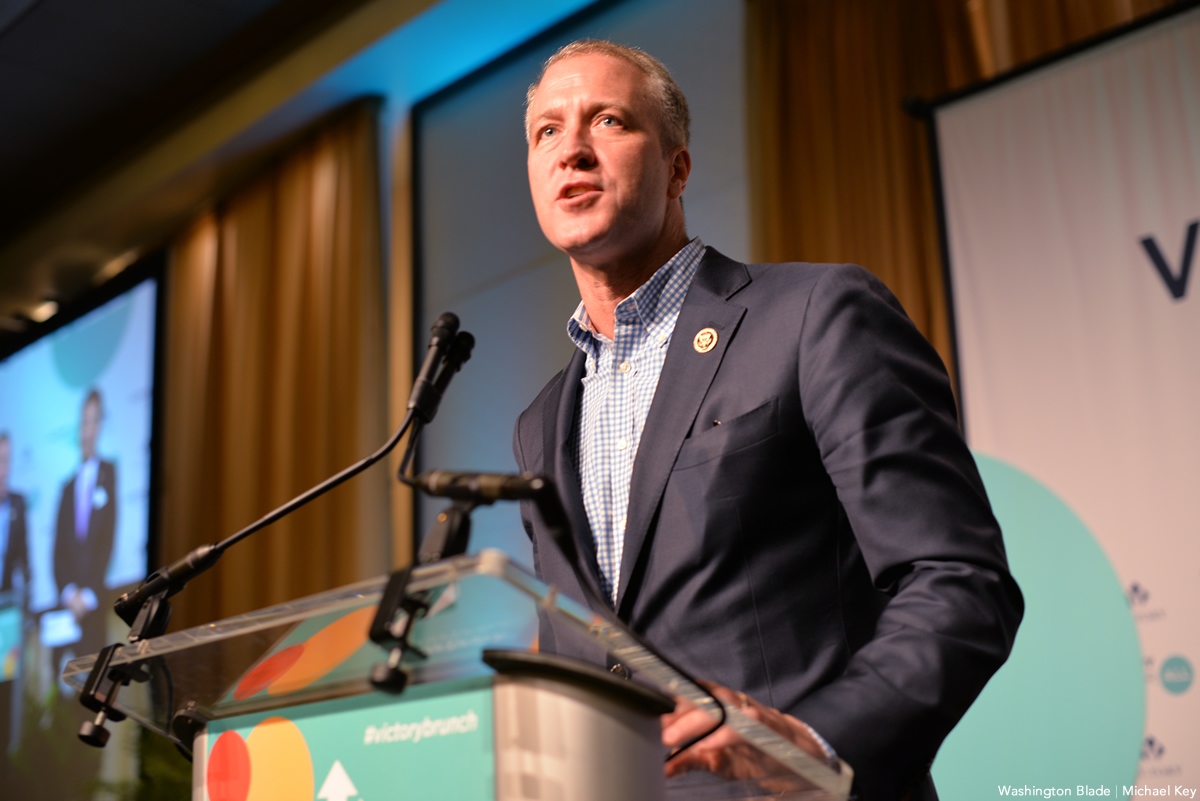State Department
Blinken: PEPFAR ‘shows us what American diplomacy can do’
Secretary of state spoke at World AIDS Day event in D.C. on Friday

Secretary of State Antony Blinken on Friday noted the President’s Emergency Plan for AIDS Relief has saved more than 25 million lives since its launch in 2003.
Blinken, who spoke at the Business Council for International Understanding’s World AIDS Day event at the Hay-Adams Hotel in D.C., said the more than $100 billion the U.S. has earmarked for PEPFAR over the last two decades has funded 70,000 new community health clinics, 3,000 new laboratories and the hiring of 340,000 health care workers.
“Entire public health systems formed, with over a dozen countries which have either reached their HIV-treatment goals or managed control of the virus altogether,” said Blinken.
Then-President George W. Bush in 2003 signed legislation that created PEPFAR. California Democrat Barbara Lee, members of the Congressional Black Caucus and Dr. Anthony Fauci, the director of the National Institute of Allergy and Infectious Diseases and chief White House medical advisor who is retiring at the end of this month, are among those who played a key role in PEPFAR’s creation.
“PEPFAR has benefitted from bipartisan support, as we’ve heard, across four presidencies, across ten Congresses,” said Blinken. “It’s resulted in an investment of more than $100 billion to the global HIV/AIDS response. This is the largest commitment by one country ever to address a single disease.”
Lee and Fauci were among those who attended the event alongside U.S. Global AIDS Coordinator John Nkengasong; Assistant Health Secretary Rachel Levine; Dr. Deborah Birx, the former White House Coronavirus Response Director, and HIV and Hepatitis Policy Institute Executive Director Carl Schmid.
Blinken in his speech noted “the systems put in place by PEPFAR have become an integral part of the health security architecture of countries around the world.”
Blinken also said PEPFAR has bolstered responses to COVID-19, Ebola and the avian flu.
“We are continuing to build on PEPFAR’s many successes to create a stronger global health security architecture to prevent, to detect, to respond to future health emergencies. Doctor Fauci, you once said that PEPFAR ‘shows what the goodwill of a nation can do,’ and you were right,” said Blinken. “PEPFAR also shows us what American diplomacy can do: Bring together governments, bring together the public and private sectors, communities to tackle challenges that none of us can actually effectively deal with alone and that creates and has created a healthier, safer and ultimately more secure world.”
Five-year PEPFAR strategy to target LGBTQ people
Blinken acknowledged there is still “very serious work still required for us to end the global HIV health epidemic by 2030,” noting HIV/AIDS continues to disproportionately impact LGBTQ and intersex people and other marginalized groups.
“Too many countries still have fragile and insufficiently resourced public health systems, which makes it difficult to offer services beyond HIV/AIDS treatments, and that undercuts our capacity to respond to emerging threats,” he said.
Blinken noted the U.S. on Thursday announced a new PEPFAR strategy that will help “fill those gaps” over the next five years. It includes the following:
• Targeted programming to help reduce inequalities among LGBTQ and intersex people, women and girls and other marginalized groups
• Partnerships with local organizations to help reach “hard-to-reach” communities.
• Economic development and increased access to financial markets to allow countries to manufacture their own antiretroviral drugs, tests and personal protective gear to give them “the capacity to meet their own challenges so that they’re not dependent on anyone else.”
“This latest PEPFAR strategy will keep making advancements like that possible so that millions more people can live healthy lives and live lives to their full potential,” said Blinken.
State Department
State Department releases annual human rights report
Antony Blinken reiterates criticism of Uganda’s Anti-Homosexuality Act

Secretary of State Antony Blinken on Monday once again reiterated his criticism of Uganda’s Anti-Homosexuality Act upon release of the State Department’s annual human rights report.
“This year’s report also captures human rights abuses against members of vulnerable communities,” he told reporters. “In Afghanistan, the Taliban have limited work opportunities for women, shuttered institutions found educating girls, and increasing floggings for women and men accused of, quote, ‘immoral behavior,’ end quote. Uganda passed a draconian and discriminatory Anti-Homosexuality Act, threatening LGBTQI+ individuals with life imprisonment, even death, simply for being with the person they loved.”
Ugandan President Yoweri Museveni last May signed the law, which contains a death penalty provision for “aggravated homosexuality.”
The U.S. subsequently imposed visa restrictions on Ugandan officials and removed the country from a program that allows sub-Saharan African countries to trade duty-free with the U.S. The World Bank Group also announced the suspension of new loans to Uganda.
Uganda’s Constitutional Court earlier this month refused to “nullify the Anti-Homosexuality Act in its totality.” More than a dozen Ugandan LGBTQ activists have appealed the ruling.
Clare Byarugaba of Chapter Four Uganda, a Ugandan LGBTQ rights group, on Monday met with National Security Council Chief-of-Staff Curtis Ried. Jay Gilliam, the senior LGBTQI+ coordinator for the U.S. Agency for International Development, in February traveled to Uganda and met with LGBTQ activists who discussed the Anti-Homosexuality Act’s impact.
“LGBTQI+ activists reported police arrested numerous individuals on the basis of their sexual orientation or gender identity and subjected many to forced anal exams, a medically discredited practice with no evidentiary value that was considered a form of cruel, inhuman, and degrading treatment and could amount to torture,” reads the human rights report.
The report, among other things, also notes Ugandan human rights activists “reported numerous instances of state and non-state actor violence and harassment against LGBTQI+ persons and noted authorities did not adequately investigate the cases.”
Report highlights anti-LGBTQ crackdowns in Ghana, Hungary, Russia
Ghanaian lawmakers on Feb. 28 approved the Promotion of Proper Human Sexual Rights and Ghanaian Family Values Bill. The country’s president, Nana Akufo-Addo, has said he will not sign the measure until the Ghanaian Supreme Court rules on whether it is constitutional or not.
The human rights report notes “laws criminalizing consensual same-sex sexual conduct between adults” and “crimes involving violence or threats of violence targeting lesbian, gay, bisexual, transgender, queer or intersex persons” are among the “significant human rights issues” in Ghana.
The report documents Hungarian Prime Minister Viktor Orbán and members of his right-wing Fidesz party’s continued rhetoric against “gender ideology.” It also notes Russia’s ongoing crackdown against LGBTQ people that includes reports of “state actors committed violence against LGBTQI+ individuals based on their sexual orientation or gender identity, particularly in Chechnya.”
The report specifically notes Russian President Vladimir Putin on July 24 signed a law that bans “legal gender recognition, medical interventions aimed at changing the sex of a person, and gender-affirming care.” It also points out Papua New Guinea is among the countries in which consensual same-sex sexual relations remain criminalized.

The Cook Islands and Mauritius in decriminalized homosexuality in 2023.
The report notes the Namibia Supreme Court last May ruled the country must recognize same-sex marriages legally performed outside the country. The report also highlights the Indian Supreme Court’s ruling against marriage equality that it issued last October. (It later announced it would consider an appeal of the decision.)
Congress requires the State Department to release a human rights report each year.
The Biden-Harris administration in 2021 released a memorandum that committed the U.S. to promoting LGBTQ+ and intersex rights abroad.
The full report can be read here.
State Department
Russian activist meets with US global LGBTQ, intersex rights envoy
Aleksander Voronov visited the State Department last week

A Russian activist last week met with the special U.S. envoy for the promotion of LGBTQ and intersex rights at the State Department.
Jessica Stern on March 29 posted to her X account a picture of Aleksandr Voronov of Coming Out, an LGBTQ advocacy group that was previously based in St. Petersburg.
“I was honored to host Coming Out activist Aleksandr Voronov at the State Department,” said Stern. “Russia’s transgender ban and designation of the so-called ‘LGBT movement’ as extremist undermines the human rights and fundamental freedoms of all Russians. We stand with all LGBTQI+ persons.”
I was honored to host @comingoutspb activist Aleksandr Voronov at the State Department. Russia’s transgender ban & designation of the so-called “LGBT movement” as extremist undermine the human rights and fundamental freedoms of all Russians. We stand with all LGBTQI+ persons.🏳️🌈 pic.twitter.com/4GpZGzBwoc
— Special Envoy Jessica Stern (@US_SE_LGBTQI) March 29, 2024
Voronov told the Washington Blade he “gave her an update on the situation with LGBTQ rights in Russia.” Voronov said Stern “was very supportive and unbelievably kind.”
The Kremlin over the last decade has cracked down on LGBTQ rights.
The Russian Supreme Court last November ruled the “international LGBT movement” is an extremist organization and banned it. The Moscow Times on March 31 reported authorities in Orenburg, a city near the country’s border with Kazakhstan that is roughly 900 miles south-southeast of Moscow, arrested a gay bar’s owner and charged him with “extremism.”
Voronov fled Russia and now lives in Lithuania.
“Most of the organizations and public activists, such as me and the organization I lead, were forced to leave the country, but continue working ‘in exile,'” Voronov told the Blade. “Most openly queer-places were closed during last months; but there are still lots of activists, organizations and of course ordinary LGBTQ individuals in Russia who are still there, and will be staying there. And we try to support them as much as we can.”
State Department
Sean Patrick Maloney confirmed as next OECD ambassador
Former N.Y. congressman lost to Mike Lawler in 2022

The U.S. Senate on Tuesday confirmed former New York Congressman Sean Patrick Maloney to become the next American ambassador to the Organization for Economic Cooperation and Development.
Maloney, the former chair of the Democratic Congressional Campaign Committee who was also former President Bill Clinton’s White House staff secretary, in 2012 became the first openly gay person elected to Congress from New York. Maloney in 2022 lost to now U.S. Rep. Mike Lawler (R-N.Y.) after the state redrew its congressional districts.
Biden last May nominated Maloney for the ambassadorship. The Senate approved it by a 63-31 vote margin.
“Thank you, all,” said Maloney in a short X post after the vote.
Michael Carpenter, the current U.S. ambassador to the OECD, is gay.
-

 State Department3 days ago
State Department3 days agoState Department releases annual human rights report
-

 Maryland4 days ago
Maryland4 days agoJoe Vogel campaign holds ‘Big Gay Canvass Kickoff’
-

 Politics3 days ago
Politics3 days agoSmithsonian staff concerned about future of LGBTQ programming amid GOP scrutiny
-

 District of Columbia21 hours ago
District of Columbia21 hours agoCatching up with the asexuals and aromantics of D.C.









